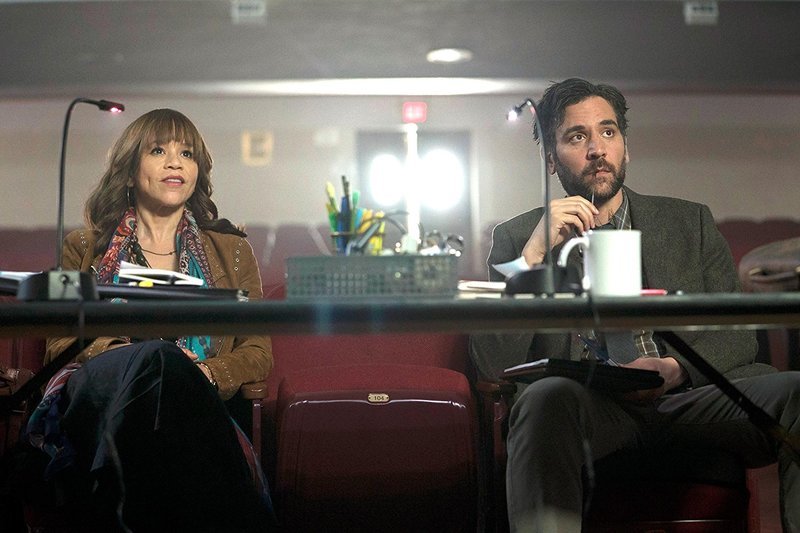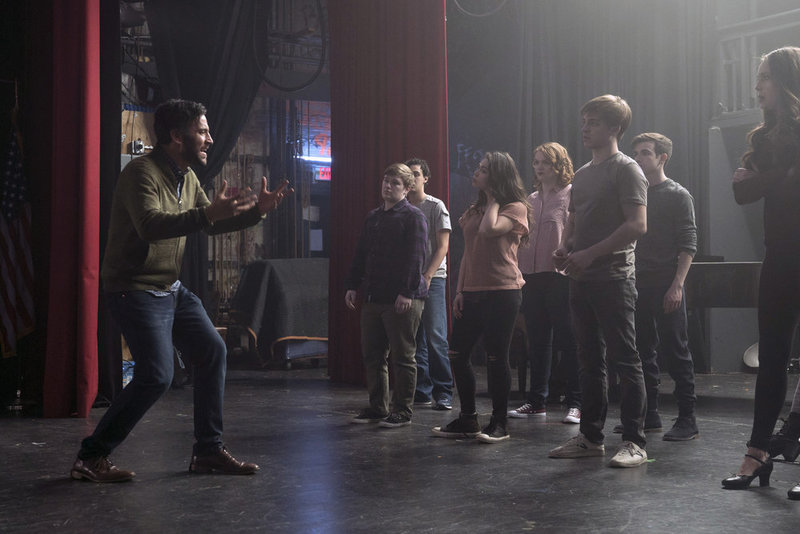
It’s perhaps fitting that the letter ‘I’ in the title cards for “Rise” rises up. This is a series that aims to inspire, full of heartfelt speeches and slow-rolling teardrops—and sometimes, it succeeds. But at nearly every turn, it’s hindered by a deeply flawed central character, and not flawed in the good, twisty, compelling drama way. “Rise” doesn’t often, if ever, acknowledge those flaws, and that makes this a series about some talented kids and the teacher that they, and we, are supposed to unquestioningly revere. It makes sense that the “I” rises up, because in spite of the character’s near-constant protestations to the contrary “Rise” isn’t all about the students. It’s all about English teacher Lou Mazzuchelli.
It’s an unfortunate blind spot, because there’s plenty to admire about “Rise,” the new NBC series from “Friday Night Lights” showrunner Jason Katims, and nearly all of it comes courtesy of the aforementioned kids. When the show, loosely adapted from Michael Sokolove’s non-fiction book “Drama High,” focuses on the young people who populate Lou Mazzuchelli’s rehearsals, it’s contrived, but in an appealing, well-meaning way. There’s the closeted kid from the religious family, the scrappy young sweetheart with a maligned single mom, the shining star quarterback with his own private struggles, the privileged princess whose family strife puts cracks in her pristine shell, the trans kid moving tentatively through his transition into living openly as a young man, the loveable kid in a terrible foster home … the list goes on. Yes, it’s a bit of a collect-them-all for teenage troubles, but they’re all reasonably well-drawn characters, played by a winning young ensemble of double- and triple-threats. When “Rise” works best, it’s invariably placing these kids at the center; when it stumbles, it’s nearly always because the series chooses to tell us how inspired they should be, rather than showing us what happens when they’re inspired.

“Mr. Mazzu” (Josh Radnor) is an English teacher at the high school in Stanton, Pennsylvania, a blue-collar community struggling to thrive in the shadow of a shuttered steel mill. Frustrated that none of his students seem to be all that interested in The Grapes of Wrath, Lou asks to take over the school’s theater department, a request granted over the head of Tracey (Rosie Perez), who’s spent a decade fighting to build and protect the program. Lou sweeps in, throws the current production of “Grease” out the window, and decides to stage “Spring Awakening” (Duncan Sheik and Steven Sater’s rock musical adaptation of a 19th century German play about sexual awakening in a repressed society) instead. From there on out, it’s all about shaking things up, from moving the “Grease” leads (Ted Sutherland and Amy Forsyth) to minor roles and casting the unexperienced Lilette (Auli'i Cravalho of “Moana”) and star quarterback Robbie (Damon J. Gillespie), to grabbing the school conductor’s baton in order to introduce the band to the glorious world of uptempo music. Chaos ensues, both on stage and in homes across the city, where the student’s struggles in rehearsals collide with the struggles their parents face at home.
If the above summary makes Mr. Mazzu sound like a bit of an asshole, then it has done its job. The show doesn’t shy away from his occasional lapses in judgment and frequent self-centeredness, but for almost none of these offenses does our hero—because the show makes that fact quite plain—suffer anything resembling consequences. Radnor’s most frequent contribution to the show is his well-honed knack for a quiet, wide-eyed apology; they occur so frequently that he must have them down to a science by this point, and they always work, if not immediately, then by the end of the next commercial break. The consequences this approach has on the show, however, are another matter.

The argument that “Rise” makes is a worthy one: the arts matter in schools because through art, kids can learn about who they are, and what they want; they can learn to process those big, messy high-school emotions and make something beautiful from them. Yet “Rise” seems startlingly disinterested in the theater itself. Instead, their production of Spring Awakening acts in three ways: as a useful set-up for moving musical montages of otherwise unconnected stories; as a chance for troubled kids to belt out their own personal pain; and as a vessel for Mr. Mazzu’s “vision.” The quotation marks there aren’t sarcastic, they’re accurate—he calls it a vision, Perez’s Tracey calls it a vision, the kids call it a vision. While he is occasionally called out for putting that vision ahead of the needs of his students and collaborators, he is almost always vindicated, and in the rare instances that the series actually acknowledges his mistakes, someone who’s been inspired by him is always around to save the day.
His vision also looks an awful lot like the first Broadway production of Spring Awakening, but that’s another story. So is the “straight-washing” of Mr. Mazzuchelli, who’s based on Lou Volpe, the now-retired drama teacher at Harry S. Truman High School, the theatre program on which Drama High is centered. Neither of those aspects of the show’fs creation are directly responsible for its failings, but they may be symptoms of the overall lack of thoughtfulness that keeps “Rise” from being as compelling as it might otherwise be, and most of that thoughtlessness is linked, in some way, to the character of Lou Mazzuchelli.
Radnor does a fine job with an off-putting role, and while there are other adults who put in good work—notably Broadway veterans Joe Tippett and Stephanie J. Block as the school’s football coach and a conservative Catholic mother, respectively—it’s again the kids that allow “Rise” to rise above its frequently frustrating material. Sutherland, Forsyth, Gillespie, and especially Cravalho all give winning performances, particularly when they’re dealing with the lives they lead outside of Stanton Drama. Nonbinary actor Ellie Desautels also excels, playing the trans student who’s just beginning to live openly as Michael. Their best scene occurs when Michael tell his male castmates he’ll be changing in the boys dressing room, and almost no one bats an eye; the cultural significance of the moment would make it powerful even without Desautels’ beautiful performance, which reveals Michael’s hidden but palpable joy and relief.
Perhaps that’s why in spite of its flaws—and there are many, from the huge missteps with Radnor’s character to serious pacing issues, and from some jarring camerawork late in the season to absurdities in the plot that even the biggest heart can’t hide—I find myself rooting for “Rise.” Whatever else it may be, its heart seems to be in the right place, and the stories of these young people are well worth hearing. Should “Rise” live on for a second season, let’s hope Katims and company find a way to course-correct.
Full season watched for review.
Allison Shoemaker is a freelance film and television critic based in Chicago.





